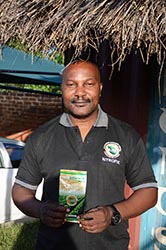Our N2Africa Country Coordinator for Malawi, Lloyd Phiphira, introduced me to Fredrick Kawalewale of Agro-Input Suppliers Limited (AISL). This company supplies seed and inoculants to smallholders. Fredrick has been working with N2Africa related to input supply since we began in Malawi in 2010. Given the obvious benefits of rhizobium inoculant with soyabean and the lack of inoculant supply he saw a business opportunity and was prepared to take the risk to set up a company to produce and sell inoculants. Lloyd and others worked together with the government scientists at Chitedze Research Station to get permission for him to take over the inoculant production methods.
|
The inoculants are produced in a small building and a transport container that has been converted into a microbiology laboratory. N2Africa trained two technicians at the IITA Ibadan labs and the inoculants have been widely tested and proved to be effective in increasing soyabean yields in Malawi. In the current 2016/2017 season, AISL sold more than 200,000 packets of rhizobium inoculants in Malawi. AISL does much more than just selling seed and inoculants – the company assists farmers to establish cooperatives to enable them to engage in purchase and in marketing – and they run their own set of demonstrations. They have also been a major collaborator in multiplying and selling seed of the soyabean variety Tikolore (TGx1740-2F) which was an early product of the IITA-TLII breeding programme in Malawi. This variety is very popular with farmers as it is tolerant to Asian rust and is early maturing. It is also promiscuous in nodulation ability – so that it can form nodules and fix nitrogen without inoculation although its yield is certainly improved when inoculated. Photo: Fredrick proudly holding a sachet of Nitrofix |
 |
 |
Left: A demonstration of best practices with soybean variety Tikolore run by AISL in Dedza District Right: A demonstration run by CARD in Kasungu District - farmers were readily convinced of the benefits of double row planting of groundnut |
 |
I was able to visit various demonstrations with Lloyd in Malawi including many in Kasungu district where farmers have been successfully trained in seed production for groundnut and soyabean. The simple technologies introduced include double row planting of groundnut and cowpea on ridges – this simple intervention gives much better ground cover, nitrogen fixation and yield – and reduces the labour required for weeding. The discussions in Malawi with Lloyd and partners reinforced my understanding that it really takes time before the technologies and the programme become cemented in the private and public sectors – N2Africa has been busy in Malawi since the beginning of 2010 and initiatives such as with AISL are now in place and will play a key role in the sustainable use of legume based technologies in the country. We’ll report on this in more detail in forthcoming editions of the newsletter
Ken Giller and Lloyd Phiphira

